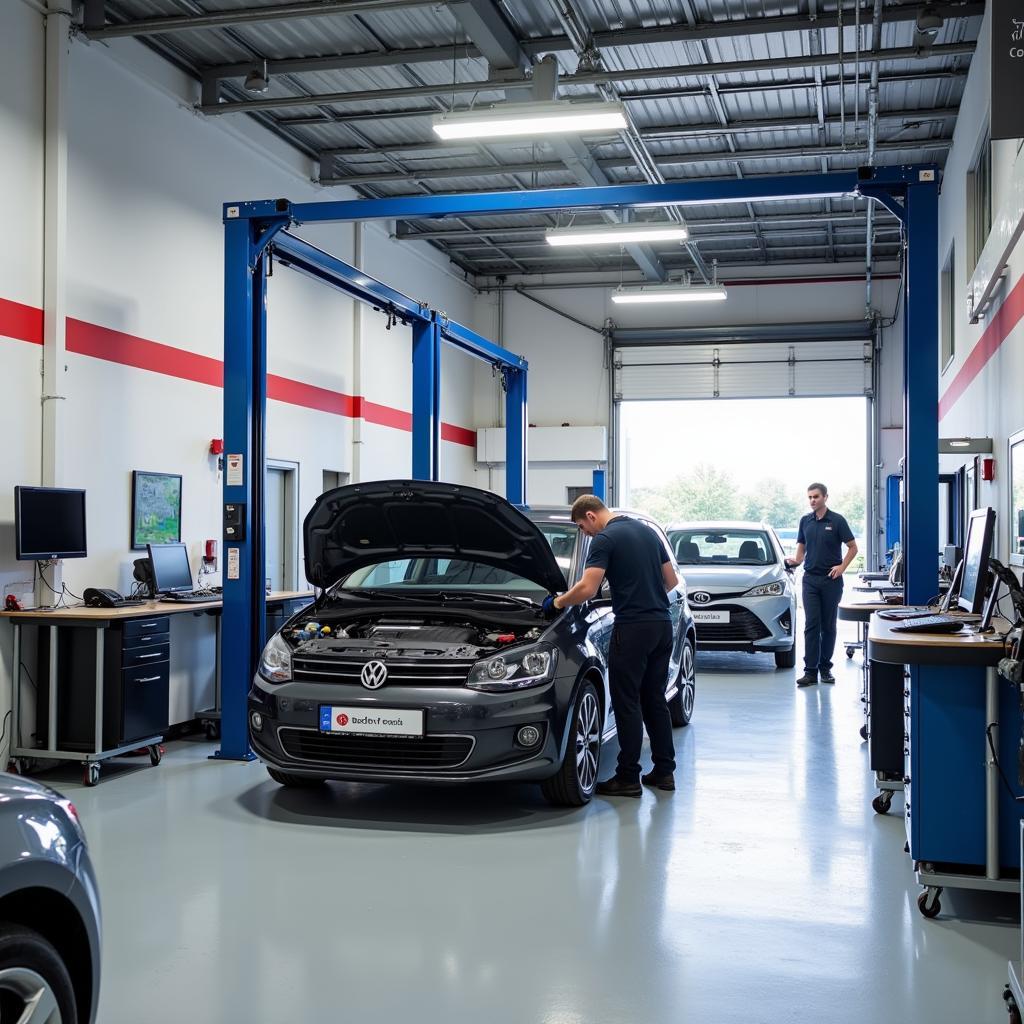Should I Get My Car Serviced Every Year?
Owning a car comes with a lot of responsibility, and ensuring it runs smoothly for years to come means committing to regular maintenance. But with so much advice floating around, it’s natural to wonder, “Should I Get My Car Serviced Every Year?” The answer, like most things car-related, isn’t a simple yes or no. Let’s dive into the factors that influence how often you should treat your car to a service appointment.
Understanding the Importance of Regular Car Servicing
Before we answer the million-dollar question, it’s important to understand why car servicing is crucial in the first place. Think of it like this: regular servicing is to your car what regular check-ups are to you. It’s preventative care at its finest.
 Benefits of Regular Car Service
Benefits of Regular Car Service
Here’s why you should prioritize those service appointments:
- Early Problem Detection: A trained mechanic can spot minor issues before they snowball into major (and expensive) repairs. This could be anything from a worn-out brake pad to a tiny oil leak.
- Enhanced Safety: Regular servicing ensures all critical safety components, like brakes, tires, and lights, are in tip-top shape, keeping you and your passengers safe on the road.
- Improved Fuel Efficiency: A well-maintained engine runs more efficiently, which translates to better fuel economy and more money saved at the pump.
- Extended Lifespan of Your Car: Consistent servicing helps keep your car running smoothly for longer, ultimately extending its lifespan and saving you the hassle of premature replacements.
- Warranty Compliance: For newer cars, adhering to the manufacturer’s recommended service schedule is often a condition for maintaining your warranty.
Factors Influencing Service Frequency
Now, back to our main question: should you service your car every year? While annual servicing is a good rule of thumb for many vehicles, the reality is that several factors influence the ideal service interval.
1. Manufacturer Recommendations
Your car’s owner’s manual is your best friend when it comes to determining the ideal service schedule. Manufacturers outline specific mileage and time-based intervals for various maintenance tasks, tailored to your car’s make and model.
2. Driving Habits and Conditions
Do you primarily embark on short city commutes or frequent long highway drives? Do you navigate heavy traffic or enjoy the open road? Your driving habits and the conditions you typically encounter significantly impact the wear and tear on your vehicle.
For instance, frequent stop-and-go city driving puts more strain on your brakes and transmission, potentially requiring more frequent servicing. Similarly, driving in harsh conditions like extreme heat, cold, or dusty environments can also necessitate more regular maintenance.
3. Vehicle Age and Mileage
As a general guideline, newer vehicles with lower mileage may only require servicing once a year or based on the manufacturer’s specified intervals. However, as your car racks up the miles and years, more frequent servicing might be necessary to address age-related wear and tear.
 An older car with the hood up, indicating potential need for more frequent servicing
An older car with the hood up, indicating potential need for more frequent servicing
4. Warning Signs and Symptoms
While adhering to a regular service schedule is crucial, it’s equally important to be vigilant about any unusual noises, smells, or performance issues with your car. Don’t ignore those dashboard warning lights! If you notice anything out of the ordinary, it’s best to err on the side of caution and take your car to a trusted mechanic for a check-up.
Types of Car Services: What to Expect
Car servicing isn’t a one-size-fits-all approach. Different service intervals entail different levels of inspection and maintenance.
-
Interim Service: Often recommended every 6 months or 6,000 miles, this service includes essential checks like oil and filter changes, tire pressure checks, and fluid top-ups. This is a great option if you’re looking for a “check-up” between full services.
-
Full Service: Typically recommended annually or every 12,000 miles, this comprehensive service covers everything in an interim service plus a thorough inspection of your car’s major components, including brakes, suspension, steering, and exhaust.
-
Major Service: Recommended every 24,000 miles or 2 years, this service is the most extensive and includes all aspects of a full service, along with additional checks and replacements as needed, such as spark plugs, fuel filters, and coolant flushes.
It’s important to note that the specific tasks included in each service level can vary depending on your car’s make and model and the service schedule outlined in your owner’s manual.
The Cost of Neglecting Car Servicing
We get it—life gets busy, and sometimes those car service appointments slip our minds. However, neglecting regular servicing can lead to more significant problems down the line, potentially costing you more in the long run.
For example, ignoring a minor oil leak could eventually lead to engine damage, which is a far more expensive repair than a simple oil change. Similarly, neglecting worn brake pads could lead to rotor damage, significantly increasing the cost of your next brake job.
Think of regular servicing as an investment in your car’s longevity and your peace of mind.
FAQs
Here are some frequently asked questions about car servicing:
Q: What if I drive less than the recommended mileage for a service?
A: Even if you don’t clock many miles, it’s still a good idea to get your car serviced at least once a year. Time can also take a toll on your car’s fluids, rubber components, and battery, even if you don’t drive frequently.
Q: Can I service my car myself?
A: While some routine maintenance tasks, like checking tire pressure or changing windshield wipers, can be done at home, it’s generally recommended to leave more complex servicing to trained mechanics. They have the expertise, tools, and knowledge to diagnose and address potential issues correctly.
Q: What happens if I miss a scheduled car service?
A: While missing a single service appointment might not spell disaster for your car, consistently neglecting recommended service intervals can void your warranty and potentially lead to more significant problems down the line.
Conclusion
So, should you get your car serviced every year? While annual servicing is a good starting point, the best approach is to consult your car’s owner’s manual and consider your driving habits, vehicle age, and any warning signs.
Remember, regular servicing is an investment in your car’s health, safety, and longevity, saving you time, money, and potential headaches down the road. Need more information on car servicing? Check out our articles on what is a car service checklist, how much is a car service ford, and [when do you need to service your car](https://carserviceo.com/when-do-you need-to-service-your-car/).
For those curious about service refunds or the consequences of skipping servicing altogether, we’ve got you covered. Dive into our articles on can you get a service refunded on a new car and what happens if you forget to service your car to learn more.
Need expert help with your car’s servicing needs? Contact us on WhatsApp: +1(641)206-8880 or Email: [email protected]. Our dedicated customer support team is available 24/7 to assist you.

